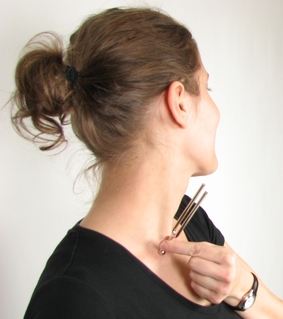Principle
In this experiment, the students can observe that sound can reach the inner ear not only via the outer and middle ear but also via the human bones. In medicine, bone conduction is used for diagnostic purposes. Based on the Rinne and Weber tests, which are used for medical diagnoses, the students will learn that bone conduction bypasses the sound conduction of the outer and middle ear. As a result, these experiments can be used to distinguish between sound conduction disorders (outer ear, middle ear) and sound sensation disorders (inner ear, auditory nerve).
The human ear perceives sound in its environment usually through the air. The sound signals are processed in three different areas of the ear: in the outer ear (auricle and outer auditory canal), middle ear (eardrum, auditory ossicles, and auditory tube), and inner ear (cochlea and vestibular system). The actual auditory information is transmitted from the inner ear to the brain by the auditory nerve. This experiment examines the question as to whether sound can also be perceived in a different way than via the outer ear.
Benefits
- Experiment is part of an experiment set with a total of 22 experiments about generation, propagation and perception of sound, oscillations and waves
- Particularly appropriate as an experiment for first contact with physics in general
- With graphic student worksheets
- With detailed instructor information
- Optimized for tight schedules, i.e. minimum preparation time required
Tasks
Examine the bone conduction of sound in the human body. Find out what an ear, nose, and throat specialist understands by a Rinne test and a Weber test and what kind of information these tests can provide.
Learning objectives
- Bone conduction
- Outer ear
- Middle ear
- Inner ear
- Auricle
- Auditory canal
- Eardrum
- Auditory ossicles
- Auditory tube
- Cochlea
- Vestibular system
- Rinne test
- Weber test


